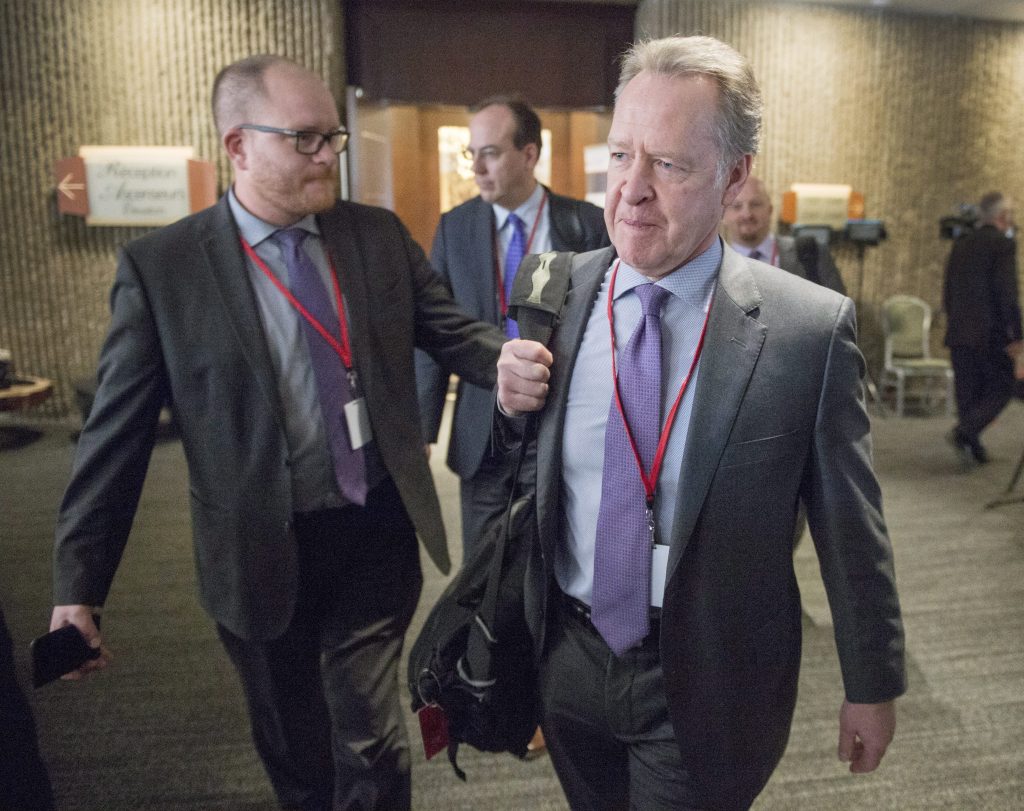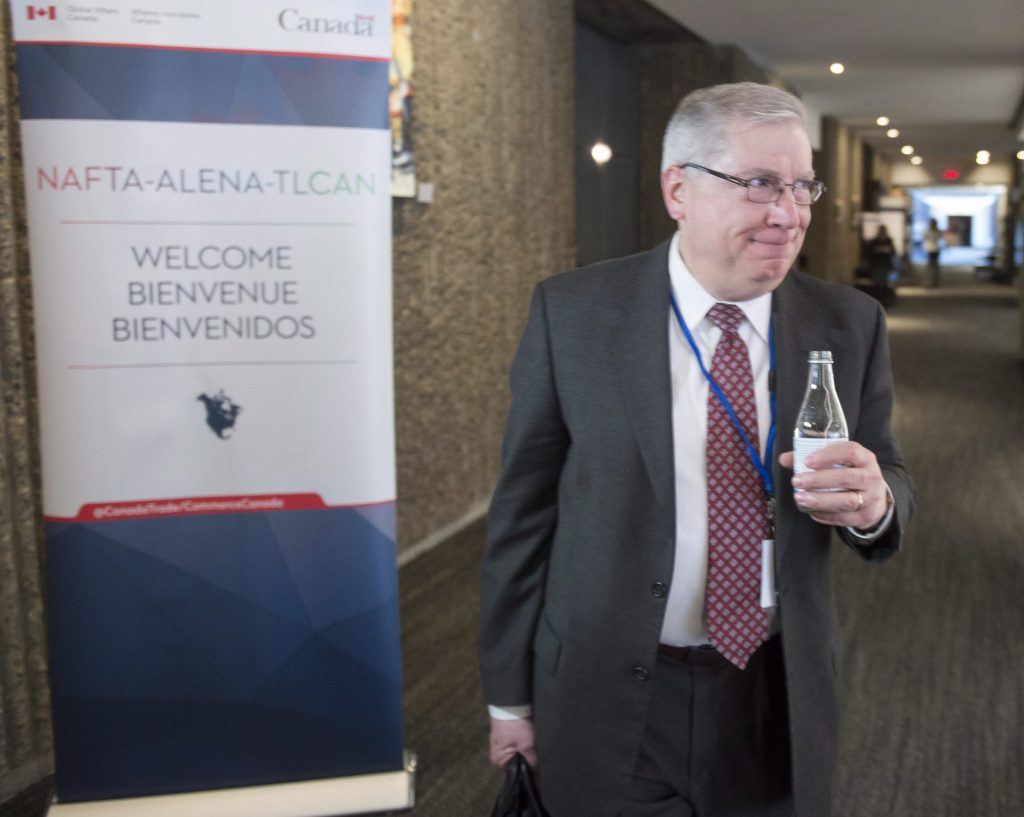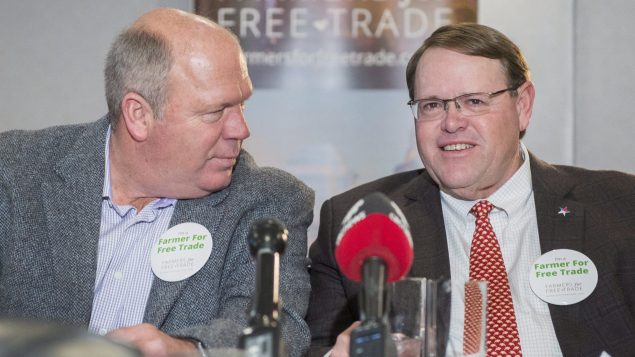Donald Trump became president of the United States in large part thanks to their steadfast support.
But now they want Trump to back off one of his key election promises and stop threatening to tear up the North American Free Trade Agreement.
American farmers are not happy with the president’s stance on NAFTA, which has opened for them lucrative markets in Mexico and Canada, and they voiced their position loud and clear in Montreal on Friday.
“Personally I don’t care for the idea of sitting at the table with half of your back turned ready to walk off is a good way to negotiate,” said Scott Frazier a farmer from southern Texas. “I think you need to come forward with the plan to make things work.”
Teams of negotiators from Canada, U.S. and Mexico are in Montreal this week for the sixth of seven planned rounds of talks on how to modernize the $1.2 trillion trade pact.
Slow progress

Canada’s chief NAFTA negotiator Steve Verheul arrives at the sixth round of the North American Free Trade Agreement negotiations on Friday, January 26, 2018 in Montreal. THE CANADIAN PRESS/Ryan Remiorz
But the progress is slow and uncertainty over NAFTA’s fate is bad for their business said members of Farmers for Free Trade, who arrived in Montreal from across the U.S. to show their support for the beleaguered trade pact.
“Our belief is that in the United States election in 2016, the loser of that election was trade,” said Brian Kuehl, executive director of Farmers for Free Trade, a bipartisan non-profit organization representing U.S. farmers. “That on the left and on the right protectionist voices spoke out against trade agreements and that was not good for the United States, and it was certainly not good for the United States agriculture.”
Agriculture in the U.S. has benefited dramatically from trade and the country is a net exporter of agricultural products, Kuehl said.
“At a time when commodity prices are low, we need to make sure that we protect agriculture in the United States by maintaining and developing new strong trade agreements,” Kuehl said.
Darci Vetter, a senior adviser to Farmers for Free Trade and former Chief U.S. Agriculture Negotiator, said Canada, U.S. and Mexico are “each other’s supplier of choice.”
“NAFTA has integrated our markets, has made us interdependent,” Vetter said. “Canada and Mexico are our number two and number three trading partners in agriculture and across the board and the relationships we have are broad and deep.”
Working against the clock
The benefits of trade in agriculture products go far beyond the farmers themselves, Vetter said.
“The largest manufacturing sector in the United States is food processing and processed food production and so manufacturing jobs depend on the success of our farmers and their markets,” she said.
Vetter said she believes NAFTA can and should be improved but negotiators are running against the clock. If negotiations are not completed by the end of March, the upcoming Mexican presidential election could push any new deal to 2019, she said.
“Time matters because uncertainty is costly and the longer we go without having clarity about the strength of that relationship with our partners, the more we provide an incentive to those partners to look elsewhere,” Vetter said. “And some of that we’ve seen in our customers diversifying their purchases.”
Concerns echoed by Canadian farmers
Gary Stordy, director of government and public relations at the Canadian Pork Council, said Canadian farmers and pork producers share the concerns of their American counterparts.
“When it comes to NAFTA, our industry has been successful,” Stordy said. “The current version of NAFTA, which some have called NAFTA 1.0, it spurred development of our industry, it allowed us to export across the world and we developed the North American integrated pork industry.”
(click to listen to the interview with Gary Stordy)
ListenAbout 32 per cent of the Canadian pork industry production is exported to the U.S., Stordy said. And Canadian pork industry also imports from the U.S. and Mexico, he said.
For example, Canadians love their pork ribs and end up importing a lot of ribs from other countries. However, at the same time Canadian pork producers export a lot of pork tenderloin cuts to other markets such as Japan, Stordy said. Having a single integrated North American market allows Canadian producers to have that flexibility, he said.
However, uncertainty over NAFTA is starting to reverberate across the nearly $5-billion industry and in the futures markets, Stordy said.
“That has an effect on investment in our industry, it has an effect on the price that producers receive for their animals,” Stordy said.
Room for optimism

John Melle, Assistant U.S. Trade Representative for the Western Hemisphere,and chief negotiator at the sixth round of the North American Free Trade Agreement leaves for the break Friday, January 26, 2018 in Montreal.THE CANADIAN PRESS/Ryan Remiorz
Work on renegotiating the agricultural files of new NAFTA is moving ahead despite the absence of the U.S. chief agriculture negotiator who hasn’t been appointed yet by the Trump administration, Stordy said.
“We do see a number of the areas such as on the modernization aspect and for our industry how meat is traded and whatnot, which is very positive,” Stordy said. “We are waiting to see how the rest of negotiations unfold.”
Stordy said he too doesn’t expect any of the agriculture chapters to be finalized in Montreal.
Still, Kuehl said he remains optimistic Trump will eventually listen to his most loyal base.
“I think one thing that’s important to understand about U.S. politics is that President Trump’s base of support, a huge chunk of his support is rural America, it’s the farmers that are growing the products and President Trump is very loyal to his base, he wants to support the people who supported him,” said Kuehl. “That gives us a bit of optimism that at the end of the day we’re not only going to see the U.S. stay in NAFTA but we’re going to push additional trade deals that are good for agriculture.”







For reasons beyond our control, and for an undetermined period of time, our comment section is now closed. However, our social networks remain open to your contributions.